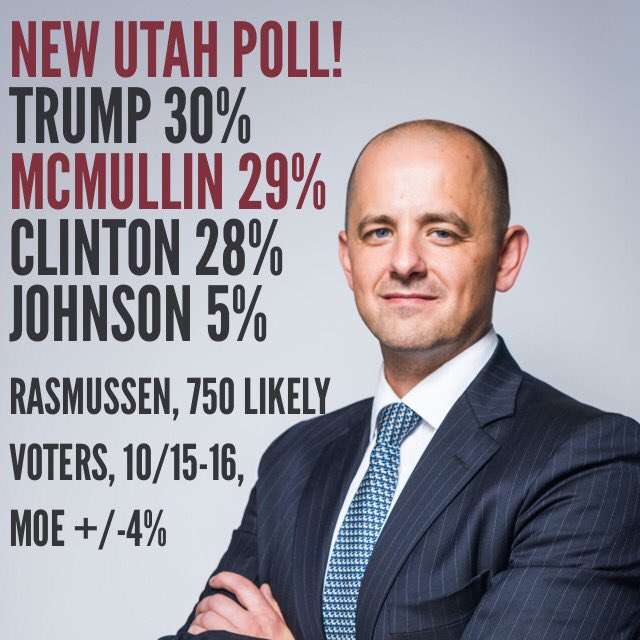Has Evan McMullin Proven He Has Party-Building Power?
His ballot access record doesn't really show it.
McKay Coppins at Buzzfeed is very impressed with the political machine might of renegade CIA Mormon former Republican Evan McMullin, who is polling strong in his home state of Utah. He believes, according to his headline, that "Evan McMullin Isn't Just Running For President — He's Literally Building A New Party."

I don't think the actual reported details, or recent American history (see the quick fade of the "Reform Party" in the wake of the last time an independent candidate, Ross Perot, did surprisingly well in a presidential run and then tried to spin a Party off that success) support that belief that a McMullin Party will be significant in America's political future, though only time will tell, as they say.
But one of the details Coppins uses to support the notion McMullin has some real political machine savvy behind him doesn't quite do so. Coppins writes that "According to his advisers, they've assembled serious state organizations across the country on a shoestring budget, enabling them to hustle their way onto 11 state ballots in the space of just 10 weeks."
Let's see how "serious" an operation one would need to achieve that.
Caveat: Unless one is a ballot access lawyer or professional, one might not be aware of certain specific tricks and complications with specific states. For sure that achivement is a sign that his campaign was able to hire a pro or two to read, study, and understand the specific requirements of the hows, wheres, and from whos of ballot access. It's always a little tricky, by design.
But the surface money and/or signature requirements for the 11 states McMullin made are not particular signs of a juggernaut machine moving forward to flatten the GOP (or the Libertarians, perhaps their true target to begin with).
According to this very useful compilation of deadlines and requirements from America's undisputed ballot access guru Richard Winger, longtime publisher of Ballot Access News, getting on those 11 ballots as an independent non-Party candidate (for the states where McMullin wasn't merely adopted by an existing Party structure that had already done the work) required a total of 14,500 signatures collected and $1,500 dollars spent. (That is the dollars-as-dollars in the states of Colorado and Louisiana which allow a pure money solution, not the dollars that almost certainly had to be paid to professional signature gatherers, always a big expense for small parties or independents.)
That's 1,400 or so signatures a week, or 200 a day. Five petitioners working eight-hour days would need to net five signatures an hour to achieve that. It isn't nothing, but I wouldn't use it as proof of stunning organizational power.
Excluded from that signature tally is New Mexico, which was a special and interesting case; it had the highest signature requirements of any of the states McMullin got on, 15,388, and indeed originally the state's secretary of state concluded the petitioners failed to gather enough, then after a lawsuit permitted him on the ballot in a pre-trial settlement. But you can add that number as well for a fuller, yet still not staggeringly impressive, assessment of the ballot access power of those on the McMullin team.
The New Mexico victory was besides technically won by the "Better for America" organization, which predated McMullin's own personal organization and is officially now dormant.
As I wrote back in June, getting on the ballot from that point was a little difficult, but not impossible, and McMullin's machine grabbed only the lowest hanging fruit.
Richard Winger at Ballot Access News details how even McMullin's small successes were achieved:
in five of those [11] states, the ticket could not have got on the ballot if prior minor party and independent presidential candidates hadn't won lawsuits against ballot access laws…
Not withstanding all the assistance that prior ballot access activism had done to benefit McMullin, the McMullin campaign has refused to join in any efforts to ease the ballot access laws. Even though he said he would sue states with unconstitutional ballot access laws, he did not do so.


Show Comments (53)